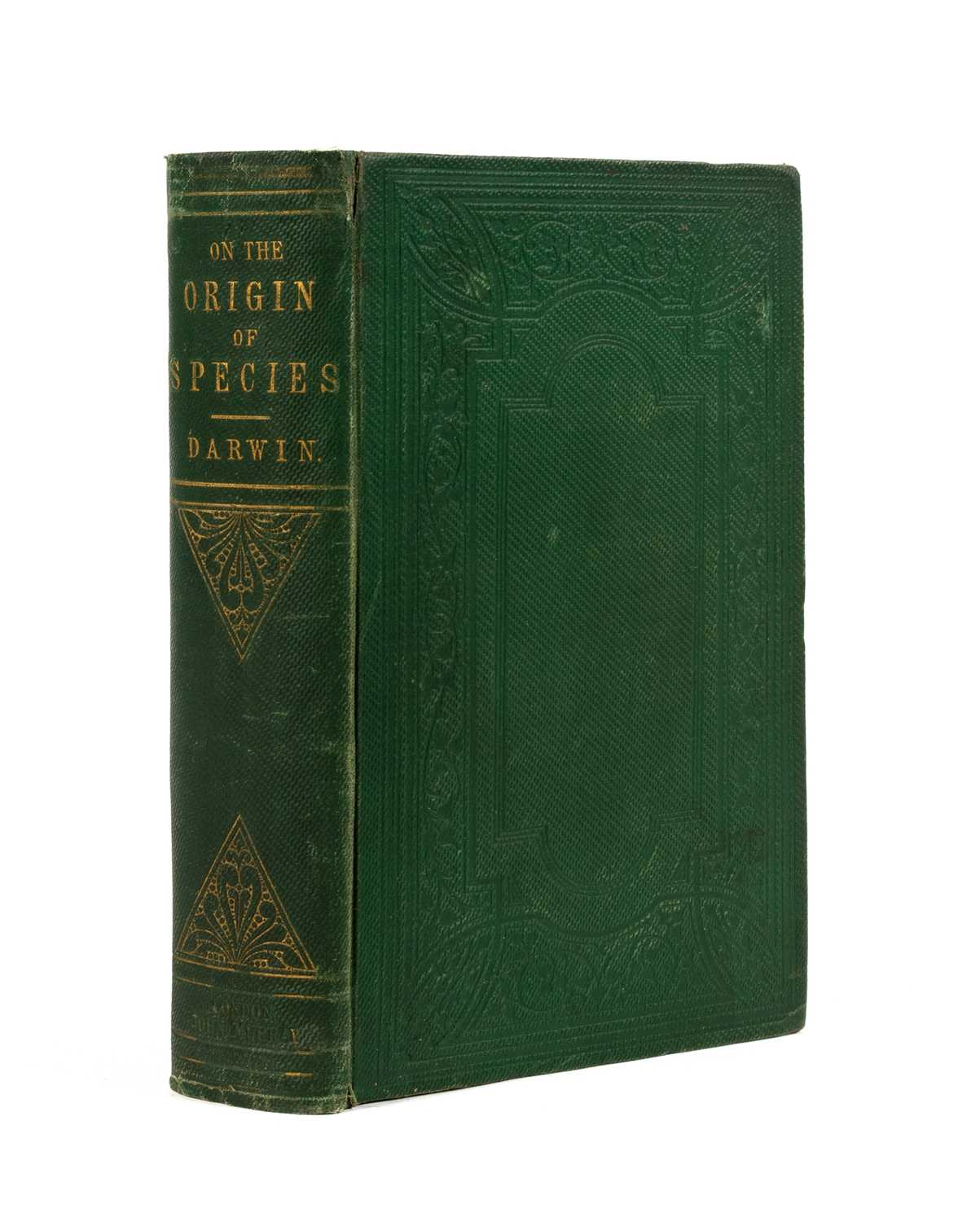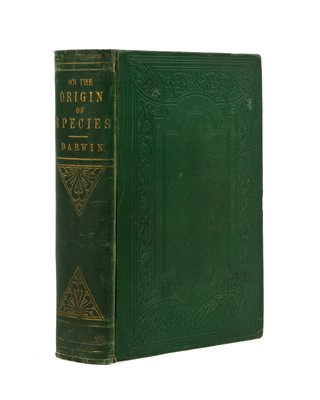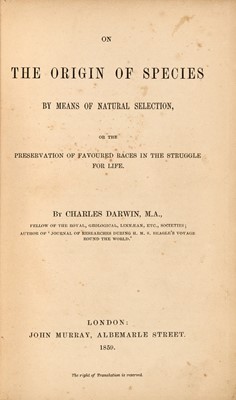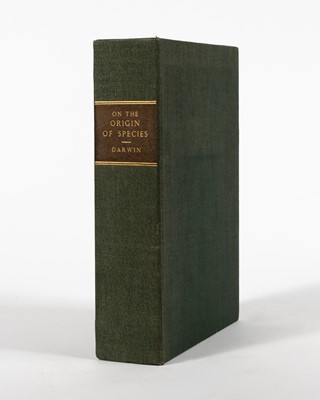Nov 7, 2023 10:00 EST
Rare Books, Autographs & Maps including the Esmond Bradley Martin Collection
233
The first edition of Darwin’s Origin of Species
DARWIN, CHARLES
On the Origin of Species by Means of Natural Selection, or the Preservation of Favoured Races in the Struggle for Life. London: John Murray, 1859. First edition, one of 1,250 copies printed. Publisher's green cloth, brown endpapers with the Edmonds & Remnants binders label on the rear paste-down (Freeman's variant b), in a later cloth clamshell case. 7 3/4 x 4 3/4 inches (20 x 12 cm); x, 502 pp., 32 pp. ads dated June 1859 as usual (these are Freeman's variant 3, no priority assigned); the folding diagram at page 117 as usual. The binding has been carefully restored with a small loss at the head of the spine infilled with new cloth, and the headcap stiffened. There is some minor rubbing and soiling to the covers, and the spine is slightly darkened, with some loss of gilt, especially to the imprint at the foot. The text block has been tightened in the binding, and the hinges repaired at the gutter of the endpapers. The preliminary leaves in the first signature have been discreetly guarded; the title page has some very minor foxing. There is a neat repaired tear to the margin of page 7. The text has a number of small pencil lines in the margin but is generally clean. The bookplate of Richard Bayard Dominick is now loose and laid-in, with some adhesive remnant on the front free endpaper.
With the publication of the Origin of Species, Darwin at a single stroke created both a new science and a fresh paradigm of thought. His book was not a specialist treatise (though it had initially been conceived as such) but was aimed instead at the educated common reader. Finally, there was a theory that could explain the diversity of biological forms, one that had an elegance and simplicity of hypothesis that its various predecessors had lacked. Though its publication was not without controversy (the religious establishment in particular reacted strongly against it, culminating in the Oxford debates of 1860), Darwin was already a scientist of high repute, and so his theories were generally well received. Despite this, the idea of evolution as such had a far broader immediate acceptance than that of natural selection, though the latter would in due course become a central 20th-century concept in the life sciences and far beyond.
Darwin was not wholly working alone in the gestation of the theory. Sir Charles Lyell, with whom he had discussed the ramifications, had been a source of encouragement. Alfred Russell Wallace had independently reached many of the same conclusions in his work, as Darwin learned with Wallace's letter of June 1858, and the two scientists had issued a joint paper on the subject at the Linnean Society on 1 July of that year. Russell wrote of the Origin (quoted here by Janet Browne) "It will live as long as the "Principia" of Newton ... Mr. Darwin has given the world a new science, and his name should in my opinion, stand above that of every philosopher of ancient and modern times. The force of admiration can no further go!!!" Modern opinion of Darwin is little different; by any reasonable accounting, this is among the most important publications in the history of science, and a turning point in the history of ideas as well, and is fundamental to the modern world-view.
As the great biologist E. O. Wilson wrote "No work of science has ever been so fully vindicated by subsequent investigation, or has so profoundly altered humanity's view of itself and how the living world works" from Wilson, E.O. 'Foreword', The Cambridge Companion to the 'Origin of Species' Cambridge: 2009. Dibner Heralds (1980) 199; Eimas Heirs 1724; Freeman 373; Garrison-Morton (1991) 220; Grolier English 96; Grolier Science 23b; Norman 593; PMM 344b; Sparrow Milestones 49; Waller 10786 etc.
Provenance:
Quentin Keynes (Charles Darwin's great-grandson); by exchange to Richard Bayard Dominick; thence by family descent to the present owner. Richard Bayard Dominick was himself an eminent naturalist, a lepidopterist who founded the Wedge Entomology Research Foundation, which still exists for the publication of books on the moths of North America.
Sold for $94,500
Estimated at $70,000 - $100,000
Includes Buyer's Premium
DARWIN, CHARLES
On the Origin of Species by Means of Natural Selection, or the Preservation of Favoured Races in the Struggle for Life. London: John Murray, 1859. First edition, one of 1,250 copies printed. Publisher's green cloth, brown endpapers with the Edmonds & Remnants binders label on the rear paste-down (Freeman's variant b), in a later cloth clamshell case. 7 3/4 x 4 3/4 inches (20 x 12 cm); x, 502 pp., 32 pp. ads dated June 1859 as usual (these are Freeman's variant 3, no priority assigned); the folding diagram at page 117 as usual. The binding has been carefully restored with a small loss at the head of the spine infilled with new cloth, and the headcap stiffened. There is some minor rubbing and soiling to the covers, and the spine is slightly darkened, with some loss of gilt, especially to the imprint at the foot. The text block has been tightened in the binding, and the hinges repaired at the gutter of the endpapers. The preliminary leaves in the first signature have been discreetly guarded; the title page has some very minor foxing. There is a neat repaired tear to the margin of page 7. The text has a number of small pencil lines in the margin but is generally clean. The bookplate of Richard Bayard Dominick is now loose and laid-in, with some adhesive remnant on the front free endpaper.
With the publication of the Origin of Species, Darwin at a single stroke created both a new science and a fresh paradigm of thought. His book was not a specialist treatise (though it had initially been conceived as such) but was aimed instead at the educated common reader. Finally, there was a theory that could explain the diversity of biological forms, one that had an elegance and simplicity of hypothesis that its various predecessors had lacked. Though its publication was not without controversy (the religious establishment in particular reacted strongly against it, culminating in the Oxford debates of 1860), Darwin was already a scientist of high repute, and so his theories were generally well received. Despite this, the idea of evolution as such had a far broader immediate acceptance than that of natural selection, though the latter would in due course become a central 20th-century concept in the life sciences and far beyond.
Darwin was not wholly working alone in the gestation of the theory. Sir Charles Lyell, with whom he had discussed the ramifications, had been a source of encouragement. Alfred Russell Wallace had independently reached many of the same conclusions in his work, as Darwin learned with Wallace's letter of June 1858, and the two scientists had issued a joint paper on the subject at the Linnean Society on 1 July of that year. Russell wrote of the Origin (quoted here by Janet Browne) "It will live as long as the "Principia" of Newton ... Mr. Darwin has given the world a new science, and his name should in my opinion, stand above that of every philosopher of ancient and modern times. The force of admiration can no further go!!!" Modern opinion of Darwin is little different; by any reasonable accounting, this is among the most important publications in the history of science, and a turning point in the history of ideas as well, and is fundamental to the modern world-view.
As the great biologist E. O. Wilson wrote "No work of science has ever been so fully vindicated by subsequent investigation, or has so profoundly altered humanity's view of itself and how the living world works" from Wilson, E.O. 'Foreword', The Cambridge Companion to the 'Origin of Species' Cambridge: 2009. Dibner Heralds (1980) 199; Eimas Heirs 1724; Freeman 373; Garrison-Morton (1991) 220; Grolier English 96; Grolier Science 23b; Norman 593; PMM 344b; Sparrow Milestones 49; Waller 10786 etc.
Provenance:
Quentin Keynes (Charles Darwin's great-grandson); by exchange to Richard Bayard Dominick; thence by family descent to the present owner. Richard Bayard Dominick was himself an eminent naturalist, a lepidopterist who founded the Wedge Entomology Research Foundation, which still exists for the publication of books on the moths of North America.
Auction: Rare Books, Autographs & Maps including the Esmond Bradley Martin Collection, Nov 7, 2023
-
Successful Auction of Rare Books, Autographs & Maps Tops $1 Million!
-
November 7, 2023 Sale Featured the Esmond Bradley Martin Collection of Africana & Travel
-
Consignments Are Currently Being Accepted for Future Auctions
NEW YORK, NY -- Doyle's successful auction of Rare Books, Autographs & Maps on November 7, 2023 topped $1 million amid competitive international bidding. Offerings in this popular sale spanned early illuminated manuscripts to modern literary first editions.
The Esmond Bradley Martin Collection of Africana and Travel comprised fascinating material that attracted bidders from around the world. Highlighting the collection was a copy of the first Latin edition of the earliest published collection of voyages, including those of Columbus and Vespucci: the 1508 Milan Fracanzo da Montalboddo, which achieved a strong $239,400. The collection also featured a rare uncut copy of Livio Sanuto's 1588 atlas of Africa that doubled its estimate at $25,200, as well as a group of 19th and early 20th century material relating to Zanzibar that attracted intense competition, sending the lots soaring over expectations. (Read more about Esmond Bradley Martin below.)
Property of other owners was highlighted by a first edition of Charles Darwin’s groundbreaking scientific work, On the Origin of Species, 1859, which realized $94,500. This copy bore provenance of Charles Darwin's great-grandson Quentin Keynes, to the naturalist Richard Bayard Dominick, thence by descent to the consignor.
Robert Browning's first edition copy of John Keats’ poem, Endymion, 1818, sold for $37,800, many times its $7,000-10,000 estimate. The poem begins with the well-known verse, "A thing of beauty is a joy for ever."
The selection of livres des artistes featured François-Louis Schmied's Daphne in a major Art Deco binding by Pierre Legrain, 1924, one of 140 copies. The book tripled its $8,000-12,000 estimate, selling for $32,760.
Manuscripts in the sale were highlighted by a medieval manuscript on paper, Calculus temporum Ecclesiasticus, which sailed past its estimate of $3,000-5,000 to achieve an exceptional $31,500. This fascinating calendrical manuscript in Latin, circa 1360, possibly English in origin, was once the property of antiquary and collector Sir Thomas Phillipps (1792-1872).
100 years before the Revolution: from Plymouth Colony to the Salem Witch Trials - The Victor Gulotta Collection, offered a curated collection of 17th and 18th century manuscripts documenting life in colonial New England. Among the rarities were a 1691 document signed by two notorious Salem witch trials magistrates John Hathorne and Jonathan Corwin that realized $5,670, a document from 1686/87 signed by Edmund Andros as Governor of the Dominion of New England that sold for $5,670, and a 1656 Boston court document relating to a divorce case that achieved $6,300, all three exceeding their estimates.
Esmond Bradley Martin
Esmond Bradley Martin (1941-2018) was educated as a geographer and philosopher. He and his wife Chryssee had an enduring fascination with Africa, and settled in Nairobi, Kenya, in the mid-1970s. He wrote extensively, oftentimes in conjunction with his wife, publishing works including Zanzibar. Tradition and Revolution, Hamish Hamilton, 1978; Cargoes of the east. The ports, trade, and culture of the Arabian Seas and western Indian Ocean, Elm Tree Press, 1978; and many other works on African history and conservation. In the late 1970s, he began extensive research into the illegal trade in elephant ivory and rhino horn, which included substantial stints incognito posing as a buyer of illicit wildlife products. For a while, he served as special envoy for rhino conservation for the United Nations. He continued this work until 2018 , when tragically he was stabbed to death in his Nairobi home
For about thirty years, beginning in the mid-1960s, Esmond Bradley Martin assiduously collected books and manuscripts on Africa and its history, acquiring a phenomenal collection of letters by many of the major English explorers of the nineteenth century, as well as numerous rarities from earlier centuries. He was buying at a time when troves of such material surfaced frequently at English auctions. Doyle was privileged to offer the first selection of his collection in the November 7 auction. A second and final portion will be offered early next year.
We Invite You to Auction!
Consignments are currently being accepted for future auctions. We invite you to contact us for a complimentary auction evaluation. Our Specialists are always available to discuss the sale of a single item or an entire collection.
For information, please contact Peter Costanzo at 212-427-4141, ext 248, or Edward Ripley-Duggan at ext. 234, or email Books@Doyle.com



